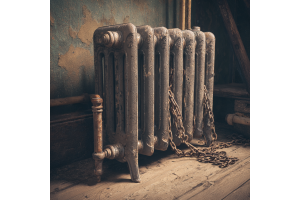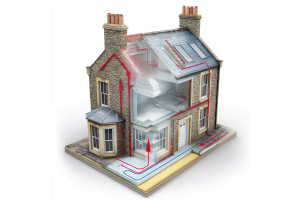
In recent years, you may have seen headlines warning about an upcoming “gas boiler ban” in the UK, often framed as if millions of households will soon be forced to rip out their existing boilers. Understandably, this has created a lot of confusion, concern, and even panic among homeowners.
The reality is more nuanced. The so-called “2026 gas boiler ban” doesn’t mean your current boiler will suddenly become illegal or unusable. Instead, it reflects the UK government’s commitment to reducing carbon emissions as part of its net-zero by 2050 strategy. Heating makes up around 14% of the UK’s total greenhouse gas emissions, so tackling how we heat our homes is critical in the journey towards a more sustainable future.
What’s Actually Happening?
-
From 2025, under the Future Homes Standard, new-build homes will no longer be fitted with traditional gas boilers.
-
From 2026, it’s expected that newly installed boilers in existing homes must be “hydrogen-ready”, meaning they can eventually run on hydrogen instead of natural gas (though final legislation is still being developed).
-
There are also long-term targets: by 2035, the government intends to phase out the sale of new gas boilers altogether, although homeowners will not be required to remove working systems.
In other words, this is a gradual transition, not an overnight ban.
Why So Much Confusion?
Many people mistakenly think the ban means:
-
Gas boilers will be completely outlawed in 2026.
-
Homeowners will be forced to replace working boilers immediately.
-
Alternatives like heat pumps will become compulsory in all homes.
None of these are true. Your existing boiler can remain in use until the end of its natural lifespan. The real change is about what happens when you eventually need a replacement, or if you’re buying a new-build property.
Why It Matters for You
Even though there’s no need to panic, it’s smart to start planning ahead. If your boiler is old or due for replacement in the next few years, understanding the ban means you can:
-
Make an informed decision about whether to replace now or wait.
-
Explore low-carbon alternatives like heat pumps, hybrid systems, or hydrogen-ready boilers.
-
Consider how upgrades like better insulation, smart thermostats, and efficient radiators (such as Geyser’s aluminium and designer ranges) can support these new heating systems.
This guide will help you cut through the noise and myths, explaining clearly what the 2026 gas boiler ban actually means for you, your home, and your heating bills.
1. What Exactly Is Being Banned—and When?
When people hear the phrase “gas boiler ban”, many imagine the government sending inspectors around in 2026 to force households to rip out working boilers. That is not the case. The ban is actually a series of phased policies designed to steer the UK towards low-carbon heating solutions, not an immediate outlawing of existing systems.
The Key Dates You Need to Know
-
2025 – The Future Homes Standard
From 2025, new-build homes will no longer be fitted with traditional gas boilers. Instead, developers will be required to install low-carbon heating systems—typically air source heat pumps, ground source heat pumps, or other renewable-ready technologies.-
This only affects new properties built after 2025.
-
If you already live in a home with a gas boiler, this change doesn’t apply to you.
-
-
2026 – Hydrogen-Ready Boilers for Replacements
From 2026, the government is expected to require that any new boiler installed in existing homes must be “hydrogen-ready.” This means the boiler will still run on natural gas for now, but can be converted to hydrogen fuel in the future, once hydrogen becomes widely available in the gas grid.-
This doesn’t mean gas boilers disappear in 2026.
-
It simply means any replacement boilers fitted from this point must be future-proofed.
-
-
2035 – The Phase-Out of New Gas Boilers
By 2035, the government’s ambition is to end the sale of new gas boilers entirely. By then, alternatives like heat pumps, hybrid systems, district heating, or hydrogen boilers are expected to become the standard.-
Importantly, households will not be required to remove or replace an existing boiler that still works.
-
The focus is on gradual transition, ensuring replacements are more sustainable.
-
What’s Not Being Banned
-
Your existing boiler – If you have a gas boiler installed today, you can keep using it until the end of its working life. There’s no requirement to rip it out in 2026.
-
Servicing and repairs – Engineers can continue to repair and service gas boilers beyond 2026.
-
Gas supply itself – The UK gas grid will remain in place for decades, with trials underway to eventually introduce hydrogen into the mix.
Why Is This Happening?
The UK’s heating systems account for about 14% of total carbon emissions. By controlling what gets installed in new builds and gradually shifting replacement systems towards low-carbon options, the government aims to:
-
Reduce reliance on fossil fuels.
-
Encourage investment in greener technologies like hydrogen-ready boilers and heat pumps.
-
Help households cut long-term heating bills as renewable tech becomes more widespread.
The Bottom Line:
The 2026 gas boiler ban doesn’t mean you’ll lose your heating overnight. It means that when your current boiler eventually needs replacing, the system you choose will likely be hydrogen-ready or a low-carbon alternative. It’s about future-proofing homes, not punishing homeowners.
2. Why the Move Away from Gas Boilers?
To understand the so-called “gas boiler ban,” it’s important to look at the bigger picture. This isn’t simply about changing heating systems — it’s part of the UK’s commitment to reach net-zero carbon emissions by 2050. Heating homes is one of the biggest contributors to the country’s carbon footprint, and gas boilers play a central role in that problem.
1. Environmental Impact
-
Carbon emissions from heating: Around 85% of UK homes are heated by gas boilers, and residential heating accounts for roughly 14% of the UK’s total greenhouse gas emissions.
-
Fossil fuel dependence: Gas is a fossil fuel. Every time your boiler fires up, it releases carbon dioxide into the atmosphere, directly contributing to climate change.
-
International commitments: Under the Paris Agreement and the UK’s legally binding Climate Change Act, the government is required to reduce emissions dramatically. Decarbonising home heating is one of the fastest ways to make progress.
2. Energy Efficiency and Cost Savings
-
Gas vs. alternatives: While modern condensing gas boilers are efficient (often 90%+), they can’t compete long-term with technologies like heat pumps, which can deliver 300–400% efficiency (3–4 units of heat for every unit of energy used).
-
Rising gas prices: The volatility of global gas markets (as seen in 2021–22) has made energy bills unpredictable. Reducing reliance on gas helps protect homeowners from future spikes.
-
Future-proofing homes: By moving to hydrogen-ready boilers, hybrid systems, or all-electric solutions, households will eventually enjoy more stable and potentially lower running costs.
3. Energy Security
-
The UK currently imports a significant amount of natural gas. Transitioning away from gas reduces reliance on foreign energy markets and enhances national energy security.
-
Developing a robust hydrogen network and expanding renewable electricity generation (wind, solar, tidal) ensures the UK’s heating supply is more resilient and homegrown.
4. Health and Air Quality
-
Burning natural gas not only releases carbon but also produces nitrogen oxides (NOx), which are harmful air pollutants.
-
Reducing reliance on gas boilers contributes to cleaner air, improving public health, especially in urban areas with high population density.
5. Technological Progress and Policy Alignment
-
Hydrogen-ready boilers are already in development and will allow homes to switch fuels when the gas grid transitions to hydrogen.
-
Heat pumps and hybrid systems are becoming more affordable, efficient, and easier to install as technology advances.
-
The ban aligns with government incentives, such as the Boiler Upgrade Scheme, which provides grants to help homeowners transition to low-carbon heating.
The Bottom Line:
The move away from gas boilers is driven by a mix of environmental responsibility, energy efficiency, cost stability, energy security, and public health benefits. Far from being just a restriction, it’s an opportunity to make homes warmer, greener, and more affordable to run in the long term.
3. What Are Your Alternatives?
The good news is that the transition away from traditional gas boilers doesn’t mean you’ll be left in the cold. A range of low-carbon heating alternatives are already available, and more options are emerging as technology evolves. The right choice for you will depend on your home type, budget, and heating needs.
1. Heat Pumps
Air Source Heat Pumps (ASHPs) and Ground Source Heat Pumps (GSHPs) are expected to become a cornerstone of the UK’s low-carbon heating strategy.
-
How they work: Instead of burning fuel, heat pumps transfer heat from the air or ground into your home, using electricity.
-
Efficiency: They can be up to 300–400% efficient (producing 3–4 units of heat per unit of electricity).
-
Best for: Well-insulated homes where steady, lower-temperature heating works effectively.
-
Considerations:
-
Installation can be costly upfront (though grants like the Boiler Upgrade Scheme offer up to £7,500 in support).
-
Radiators may need upgrading to larger or more efficient models, like aluminium radiators, which work well with lower flow temperatures.
-
They require outdoor space for the pump unit (ASHP) or ground loops (GSHP).
-
2. Hydrogen-Ready Boilers
One of the most likely stepping stones in the transition.
-
How they work: These boilers look and function almost exactly like modern gas boilers but are designed to switch from natural gas to 100% hydrogen when the grid is ready.
-
Efficiency: Similar to gas boilers, but without the carbon emissions once hydrogen becomes available.
-
Best for: Homeowners who want minimal disruption and a familiar technology.
-
Considerations:
-
Hydrogen supply across the UK isn’t expected until the 2030s, so this is a future-proofing option.
-
In the meantime, they run on natural gas just like your current boiler.
-
3. Hybrid Systems
A “best of both worlds” approach that combines a heat pump with a gas or hydrogen-ready boiler.
-
How they work: The heat pump covers the majority of heating needs efficiently, while the boiler kicks in during very cold weather or when extra hot water demand is needed.
-
Efficiency: Optimised to balance efficiency and comfort across seasons.
-
Best for: Homes where full heat pump installation isn’t practical yet, or where maximum reliability is needed.
-
Considerations:
-
Offers flexibility but can be more complex to install and manage.
-
Good transitional option for households not ready to go fully electric.
-
4. Direct Electric Heating
Includes electric boilers, panel heaters, infrared panels, or storage heaters.
-
How they work: Use electricity to directly generate heat.
-
Efficiency: Technically 100% efficient at point of use, but running costs can be higher than gas due to electricity prices.
-
Best for: Flats, smaller homes, or well-insulated properties with low heat demand.
-
Considerations:
-
Works well if combined with renewable electricity sources (e.g. solar panels).
-
Can be costly if relied on exclusively for high-demand homes.
-
5. District Heating / Heat Networks
Becoming increasingly common in urban developments.
-
How they work: Multiple buildings or homes are connected to a central heat source (such as a large heat pump, combined heat and power plant, or renewable energy system).
-
Efficiency: Benefits from economies of scale and can use renewable or waste heat.
-
Best for: New-build developments or dense urban areas.
-
Considerations:
-
Limited availability for existing homes outside of planned networks.
-
Supporting Upgrades: Radiators & Controls
No matter which system you choose, pairing it with the right radiators and smart controls is crucial:
-
Aluminium radiators (like those from Geyser) heat up and cool down quickly, making them perfect for heat pumps and hybrid systems.
-
Smart thermostats and TRVs ensure rooms are heated only when needed, maximising efficiency.
-
Improved insulation and draught-proofing will boost the performance of any system, reducing energy demand.
The Bottom Line:
There is no single “one-size-fits-all” replacement for gas boilers. Instead, you’ll be choosing from a range of alternatives—from heat pumps and hybrid systems to hydrogen-ready boilers—based on what works best for your home. The common theme? Heating that’s cleaner, smarter, and increasingly cost-effective over time.
4. What You Should Do Now
Hearing about a “gas boiler ban” can sound intimidating, but the reality is that you don’t need to rush into expensive changes right away. Instead, this is the moment to plan ahead, understand your options, and make smart decisions that suit your home, your budget, and your long-term comfort.
1. Don’t Panic – Your Current Boiler Is Still Valid
-
If you’ve recently installed a gas boiler, you can continue using it until the end of its natural life (often 10–15 years).
-
There is no legal requirement to remove or replace a working boiler in 2026.
-
Servicing and repairs will still be available well into the 2030s.
Translation: If your boiler is relatively new, relax — you’ve got time.
2. Assess Your Boiler’s Age and Condition
-
If your boiler is over 10 years old, or showing signs of inefficiency (frequent breakdowns, high bills, uneven heating), now is the time to start planning its replacement.
-
You don’t need to replace it tomorrow, but being proactive means you won’t be caught off guard when the time comes.
3. Improve Your Home’s Energy Efficiency
Before even thinking about swapping your heating system, make sure your home is ready to hold on to the heat:
-
Insulation: Upgrade loft, cavity wall, or solid wall insulation to reduce heat loss.
-
Windows and doors: Ensure they are double/triple glazed and draught-proofed.
-
Radiator upgrades: Efficient aluminium or designer radiators (like Geyser’s range) work especially well with low-temperature systems such as heat pumps.
-
Smart controls: Add thermostatic radiator valves (TRVs) and programmable thermostats to heat rooms only when needed.
These steps often deliver quicker savings than replacing your boiler.
4. Learn About Low-Carbon Alternatives
The heating market is evolving fast. Take time to understand:
-
Heat pumps – efficient and increasingly supported by government grants.
-
Hydrogen-ready boilers – familiar technology that will allow an easy switch in the 2030s.
-
Hybrid systems – combining heat pumps with boilers for flexibility.
-
Electric heating – viable for smaller or very efficient homes.
Doing your homework now means when your boiler eventually needs replacing, you’ll already know which option fits your home best.
5. Keep an Eye on Government Schemes
There are already incentives to support greener heating:
-
Boiler Upgrade Scheme (BUS): Provides grants of up to £7,500 to help homeowners switch to heat pumps.
-
Future schemes are expected to expand as 2026 approaches.
-
Keeping informed could save you thousands on installation costs.
6. Talk to Heating Experts
-
Get a professional assessment of your home’s heating needs.
-
Heating engineers can advise whether your property is better suited to a heat pump, hybrid system, or hydrogen-ready boiler.
-
Companies like Geyser can help you choose the right radiators and supporting technologies to maximise efficiency.
7. Plan Financially
-
Switching to a new heating system can involve upfront costs, even if running costs are lower in the long run.
-
By planning ahead now, you can budget gradually, take advantage of grants, and avoid emergency replacement scenarios.
The Bottom Line:
You don’t need to rip out your gas boiler in 2026, but you shouldn’t ignore the changes either. By improving your home’s insulation, learning about alternatives, upgrading to efficient radiators, and staying informed about government schemes, you’ll be ready to make the switch on your terms, not in a panic.
5. Timeline at a Glance
The “2026 gas boiler ban” isn’t a single moment when gas boilers suddenly vanish. Instead, it’s a phased transition stretching over the next decade and beyond. Understanding the timeline helps you know what applies to you, and when.
Key Dates You Should Know
2025 – New Builds Go Gas-Free
-
Under the Future Homes Standard, newly built homes will no longer be fitted with traditional gas boilers.
-
Developers must install low-carbon heating systems such as heat pumps or connection to heat networks.
-
This change does not apply to existing homes.
2026 – Hydrogen-Ready Boilers Become Standard
-
If you replace your boiler after 2026, it is expected that it must be “hydrogen-ready.”
-
These boilers work on natural gas now but can be converted to hydrogen in future, once supply is available.
-
Existing gas boilers can still be repaired and maintained.
2028 – Heat Pump Target
-
The government aims to install 600,000 heat pumps per year by 2028.
-
To support this, grants (such as the Boiler Upgrade Scheme) are available to help households cover upfront costs.
-
Heat pumps are likely to become more affordable and accessible by this stage.
2030s – Gradual Rollout of Hydrogen
-
Large-scale trials of hydrogen heating will shape how and when the UK gas grid starts blending hydrogen with natural gas.
-
Hydrogen-ready boilers installed after 2026 will then be able to switch fuels.
-
Hybrid systems (boiler + heat pump) may become more common as a transitional solution.
2035 – No More New Gas Boilers
-
By 2035, the government intends to phase out the sale of new gas boilers altogether.
-
Households won’t be forced to remove working boilers, but when they reach end-of-life, they’ll be replaced with a low-carbon alternative (heat pump, hydrogen-ready system, hybrid, or district heating).
2050 – Net Zero Target
-
By this year, virtually all UK homes will have transitioned away from fossil-fuel heating.
-
The long lead time ensures homeowners can replace systems naturally, without sudden costs or disruption.
At a Glance: Boiler Ban Timeline
-
2025: No gas boilers in new builds.
-
2026: Only hydrogen-ready boilers allowed in replacements.
-
2028: 600,000 heat pumps installed per year target.
-
2030s: Hydrogen rollout begins; hybrid systems expand.
-
2035: No new gas boiler sales.
-
2050: Net zero – all homes using low-carbon heating.
The Bottom Line:
The transition is gradual and manageable. You don’t need to act immediately, but being aware of the timeline allows you to plan upgrades strategically — taking advantage of grants, new technologies, and efficient radiators to future-proof your home.
Conclusion: Preparing for the Future of Home Heating
The phrase “gas boiler ban” may sound drastic, but the reality is far more measured. The government isn’t forcing homeowners to rip out working boilers in 2026. Instead, it’s guiding the country on a gradual journey toward cleaner, more sustainable heating systems that will support the UK’s net-zero targets.
-
2025 marks the end of gas boilers in new-build homes.
-
2026 introduces hydrogen-ready boilers for replacements, ensuring future flexibility.
-
2035 ends the sale of new gas boilers entirely, with low-carbon options taking over.
-
2050 is the ultimate destination: net zero, with nearly all homes powered by greener heating.
For homeowners, the important thing is not to panic. Your current boiler will remain legal and usable until it naturally reaches the end of its lifespan. But it is smart to start planning ahead now — by improving insulation, upgrading radiators to more efficient models, and learning about low-carbon alternatives like heat pumps, hybrid systems, and hydrogen-ready boilers.
This transition also brings opportunities. Switching to a greener system can mean:
-
Lower energy bills in the long term.
-
More stable energy supply with reduced reliance on volatile global gas markets.
-
Greater comfort when paired with efficient radiators and smart controls.
-
Positive environmental impact, helping reduce household emissions.
At Geyser, we believe the future of heating doesn’t just have to be efficient — it can also be stylish and smart. Our range of designer and aluminium radiators are built to work seamlessly with modern heating technologies, ensuring your home stays warm, sustainable, and beautiful for years to come.
The Bottom Line:
The 2026 boiler changes aren’t a threat — they’re an opportunity to make your home warmer, greener, and future-proof. By staying informed and planning strategically, you can take full advantage of the transition and enjoy comfort, savings, and peace of mind along the way.







